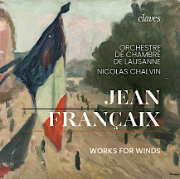Plea for an anticyclist
A double quintet of the Orchestre de chambre de Lausanne presents the entertaining wind music of Jean Françaix.

His music is full of wit, sparkling ingenuity and rhythmic sophistication: We are talking about Jean Françaix, a unique figure of the 20th century. Born in Le Mans in 1912, the French composer was anything but an avant-gardist; his music is based on Stravinsky's neoclassicism, but also internalizes the elegance and finesse of Francis Poulenc and the Groupe des Six in general. Françaix remained true to his line until his death in Paris in 1997.
While he achieved his international breakthrough in 1936 in Baden-Baden with a Concertino for piano and orchestra, he is particularly distinguished by his extensive oeuvre for wind instruments. The unusual instrumentation of his entertaining wind music is probably the main obstacle to its widespread distribution. Examples of this are his well-known Neuf pièces caractéristiques which were composed for ten wind instruments and are therefore rarely heard in the concert hall.
The wind section of the Orchestre de chambre de Lausanne under the direction of Nicolas Chalvin now remedies this, at least on CD. One marvels at the rhythmic accuracy of the motoric progression of the introductory Presto and the profundity of the elegiac, charming Amoroso that follows. It is a strong plea for music that is little known to the public.
The program sequence is cleverly structured, which sensibly begins with a Musique pour faire plaisir by Poulenc-Françaix, which puts us right in the middle of this rare, witty and eloquent "musical idiom" with two flutes, oboes, clarinets, bassoons and horns. Many of the pieces presented are arrangements, such as three Écossaises by Chopin or the Cortège burlesque by Chabrier.
The recording ends with Trois marches militaires by Schubert-Françaix, which are sometimes reminiscent of wind serenades from the early Classical period, but also seem somewhat lengthy, although the ensemble is stylistically confident in its use of the pieces. As a caveat, it should be noted that the "miniatures", most of which do not last longer than two minutes, can be tiring for an audience that is not exclusively affine to wind instruments.
Jean Françaix: Works for winds. Orchestre de chambre de Lausanne; conductor Nicolas Chalvin. Claves CD 50-3032








